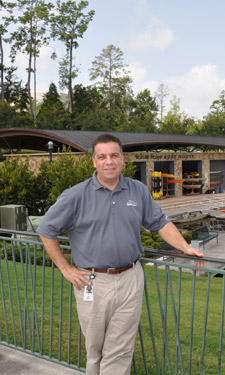 Professional certification is gaining popularity and validity in the field of parks and recreation, thanks largely to the efforts of people like Chris Nunes, a Certified Parks and Recreation Executive (CPRE) who serves as chair of the Certified Parks and Recreation Professional (CPRP) Committee as well as director of Parks and Recreation for The Woodlands, Texas. He has also been on the Council of Accreditation of Parks, Recreation, Tourism, and Related Professions (COAPRT) for six years and is an approved Commission for Accreditation of Park and Recreation Agencies (CAPRA) visitor, as well as a COAPRT visitor.
Professional certification is gaining popularity and validity in the field of parks and recreation, thanks largely to the efforts of people like Chris Nunes, a Certified Parks and Recreation Executive (CPRE) who serves as chair of the Certified Parks and Recreation Professional (CPRP) Committee as well as director of Parks and Recreation for The Woodlands, Texas. He has also been on the Council of Accreditation of Parks, Recreation, Tourism, and Related Professions (COAPRT) for six years and is an approved Commission for Accreditation of Park and Recreation Agencies (CAPRA) visitor, as well as a COAPRT visitor.
You have been a strong advocate for the CPRP program for many years and have held this certification yourself since 2000. Why do you believe certification is an important step toward becoming a professional in the field of parks and recreation?
Certification is a standard the profession has developed over the course of the past 20-plus years. For me to consider myself a professional, I feel I must meet or exceed the standards set forth by the profession. As the profession continues to grow, develop, and set forth new standards, I felt it would benefit my career and my community to obtain these certifications. This is one of the reasons why I took the CPRP exam in 2000 and why I decided to take the CPRE exam in 2011.
Aside from benefiting the individual, how does professional certification benefit the public?
The public benefits greatly from the certification process as it is one measure of quality assurance the profession has developed. With the certification process, the public is provided with professionals who have met minimum standards for education and experience. Secondly, they are assured of professionals who are staying current through the attainment of continuing education units or through professional service.
What motivated you to volunteer as part of the CPRP committee?
Overall, I wanted to be a part of the CPRP committee as it allowed me to better understand the need for the test, how the test was put together, and the pivotal role it can play in further developing our profession. If I was going to be an advocate for professional development, I felt that I needed to be part of the process.
What challenges do you face in your efforts to promote professional certification in the field of parks and recreation?
There are many challenges related to promoting professional certification; some of them are related to cost, certification qualifications, and understanding of the importance of certification. Professionals need to recognize the CPRP is a “minimum-competency” certification, thus these professionals have to meet a minimum standard set forth by the CPRP Committee and the National Certification Board. Now that the CPRE has been developed, the profession will be able to differentiate between a minimum and a master competency, thus making the value of these certifications more easily understood by the public and the profession.
What advice do you have for prospective CPRP candidates?
CPRP candidates should recognize the test considers the “best approach or practice” in the industry, not a certain geographic section of the country. Also, candidates need to read the entire question and not jump to conclusions about what the question is trying to state. There are no trick questions, but when I hear of problems, it is usually due to reading the question too fast or assuming what the question was asking. Lastly, the candidate should employ quality test-taking management techniques. Read and review the study guide, take the practice exams, have a small study group of other professionals to bounce practice test questions off of, and then take your time taking the test.
Learn more about the Certified Park and Recreation Professional (CPRP) program.

